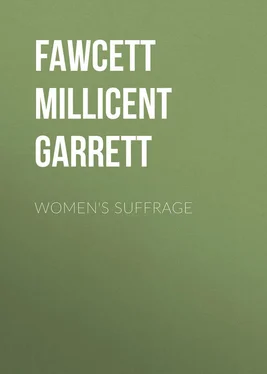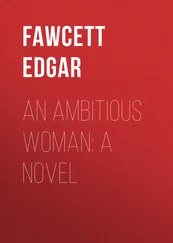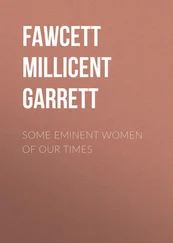Millicent Fawcett - Women's Suffrage
Здесь есть возможность читать онлайн «Millicent Fawcett - Women's Suffrage» — ознакомительный отрывок электронной книги совершенно бесплатно, а после прочтения отрывка купить полную версию. В некоторых случаях можно слушать аудио, скачать через торрент в формате fb2 и присутствует краткое содержание. Издательство: Иностранный паблик, Жанр: foreign_antique, foreign_prose, на английском языке. Описание произведения, (предисловие) а так же отзывы посетителей доступны на портале библиотеки ЛибКат.
- Название:Women's Suffrage
- Автор:
- Издательство:Иностранный паблик
- Жанр:
- Год:неизвестен
- ISBN:нет данных
- Рейтинг книги:3 / 5. Голосов: 1
-
Избранное:Добавить в избранное
- Отзывы:
-
Ваша оценка:
- 60
- 1
- 2
- 3
- 4
- 5
Women's Suffrage: краткое содержание, описание и аннотация
Предлагаем к чтению аннотацию, описание, краткое содержание или предисловие (зависит от того, что написал сам автор книги «Women's Suffrage»). Если вы не нашли необходимую информацию о книге — напишите в комментариях, мы постараемся отыскать её.
Women's Suffrage — читать онлайн ознакомительный отрывок
Ниже представлен текст книги, разбитый по страницам. Система сохранения места последней прочитанной страницы, позволяет с удобством читать онлайн бесплатно книгу «Women's Suffrage», без необходимости каждый раз заново искать на чём Вы остановились. Поставьте закладку, и сможете в любой момент перейти на страницу, на которой закончили чтение.
Интервал:
Закладка:
Other influences were operating to open political activity to women. Their help and co-operation were warmly welcomed by the Anti-Corn Law League. Cobden, at one of the great meetings of the League held in Covent Garden Theatre in 1845, said that he wished women could vote. A few years later than this the Sheffield Female Political Association passed a resolution in favour of women's suffrage, and presented a petition in this sense to the House of Lords. The refusal to allow women who had been duly appointed as delegates in the United States to take their places in the Anti-Slavery Congress held in London in 1840 roused a great deal of controversy, especially as William Lloyd Garrison, the leader of the Anti-Slavery Movement in America, [9] See the interesting picture in the staircase of the National Portrait Gallery, London.
declared that if the ladies were excluded he would share their exclusion with them; he did this, and sat with them in a side gallery, taking no part in the discussion. The opponents of the women took refuge, as they have so often done before and since, in an affirmation that they were the special repositories of the Divine Will on the subject, and declared that it was contrary to the ordinances of the Almighty that women should take part in the Congress. The treatment they had received in London naturally caused great indignation on the part of the American ladies, among whom were Elizabeth Cady Stanton and Lucretia Mott. When they returned to their own country they immediately began to work for the political enfranchisement of women, and the first Women's Rights Convention was held in the United States at Seneca Falls in 1848. This was the beginning of definite work for women's suffrage in the United States.
In England in the 'fifties came the Crimean War, with the deep stirring of national feeling which accompanied it, and the passion of gratitude and admiration which was poured forth on Miss Florence Nightingale for her work on behalf of our wounded soldiers. It was universally felt that there was work for women, even in war – the work of cleansing, setting in order, breaking down red tape, and soothing the vast sum of human suffering which every war is bound to cause. Miss Nightingale's work in war was work that never had been done until women came forward to do it, and her message to her countrywomen was educate yourselves, prepare, make ready; never imagine that your task can be done by instinct, without training and preparation. Painstaking study, she insisted, was just as necessary as a preparation for women's work as for men's work; and she bestowed the whole of the monetary gift offered her by the gratitude of the nation to form training-schools for nurses at St. Thomas's and King's College Hospitals.
When a fire is once kindled many things will serve as fuel which to a superficial glance would seem to have no connection with it. The sufferings and torture of women during the Indian Mutiny heroically borne helped people to see that Empire is built on the lives of women as well as on the lives of men.
"On the bones of the English
The English flag is stayed,"
means that women as well as men have laid down their lives for their country.
In 1857 the movement among women for political recognition was stimulated in quite a different way. In that year the Divorce Act was passed, and, as is well known, set up by law a different moral standard for men and women. Under this Act, which is still in force (1911), a man can obtain the dissolution of his marriage if he can prove one act of infidelity on the part of his wife; but a woman cannot get her marriage dissolved unless she can prove that her husband has been guilty both of infidelity and cruelty. Mr. Gladstone vehemently opposed this Bill. It is said that "in a ten hours' debate on a single clause he made no less than twenty-nine speeches, some of them of considerable length." [10] Morley's Life of Gladstone , vol. i. p. 571.
All these things prepared the way for the movement which took definite shape in the next decade.
CHAPTER II
WOMEN'S SUFFRAGE QUESTION IN PARLIAMENT – FIRST STAGE
"All who live in a country should take an interest in that country, love that country, and the vote gives that sense of interest, fosters that love." – Rt. Hon. W. E. Gladstone.
The women's suffrage question in 1860 was on the point of entering a new phase – the phase of practical politics. Parliamentary Reform was again before the country; the principles of representation were constantly discussed in newspapers, and in every social circle where intelligent men and women met.
James Mill's article on "Government," referred to in Chapter I., has been described as being "out of sight the most important in the series of events which culminated in the passing of the Reform Act of 1832." [11] James Mill: a Biography , by Alexander Bain, LL.D., p. 215.
The works of his son, John Stuart Mill, had a similar influence on the series of events which led up to the passing of the Reform Act of 1867. But whereas James Mill had specifically excluded women from his argument, John Mill as specifically and with great force and vigour included them.
In his Political Economy , and in his collected essays, and, of course, in his Liberty , it was easy to perceive that he strongly condemned the condition of subordination to which the mass of women had been from time immemorial condemned. But in his Representative Government , published in 1861, he put forward in a few eloquent pages of powerful argument the case for the extension of the suffrage to women, showing that all the arguments by which the principles of representative government were supported were equally applicable to woman. [12] Representative Government , by J. S. Mill, pp. 175-180.
The volumes of his correspondence, published in 1908, show how constantly his mind dwelt on the grave injustice to women involved by their exclusion from political rights, and also how deeply he was convinced that the whole of society loses by treating them as if they had no responsibility for the right conduct of national affairs. It was an enormous advantage to the whole women's movement, not only in England, but all over the world, that it had for its leader and champion a man in the front rank of political philosophers and thinkers. He formed a school at the universities, and in all centres of intellectual activity, and from that school a large number of the chief leaders and supporters of the women's movement have been derived.
As early as 1851 an essay on the "Enfranchisement of Women" had appeared in the Westminster Review . It had been written by Mrs. J. S. Mill, and took the form of a review of the proceedings of a Convention of Women held in Worcester, Massachusetts, in the previous year to promote the cause of the political enfranchisement of women.
The essay is a complete and masterly statement of the case for the emancipation of women. The terminology is a little out of date, but the state of mind which she exposes is perennial. We can all, for instance, recognise the applicability of the following sentences to the present time: —
"For with what truth or rationality could the suffrage be termed universal while half the human species remain excluded from it? To declare that a voice in the government is the right of all, and demand it only for a part – the part, namely, to which the claimant belongs – is to renounce even the appearance of principle. The Chartist, who denies the suffrage to women, is a Chartist only because he is not a lord; he is one of those levellers who would level only down to themselves." [13] Dissertations and Discussions , by J. S. Mill, vol. ii. p. 417.
Интервал:
Закладка:
Похожие книги на «Women's Suffrage»
Представляем Вашему вниманию похожие книги на «Women's Suffrage» списком для выбора. Мы отобрали схожую по названию и смыслу литературу в надежде предоставить читателям больше вариантов отыскать новые, интересные, ещё непрочитанные произведения.
Обсуждение, отзывы о книге «Women's Suffrage» и просто собственные мнения читателей. Оставьте ваши комментарии, напишите, что Вы думаете о произведении, его смысле или главных героях. Укажите что конкретно понравилось, а что нет, и почему Вы так считаете.












